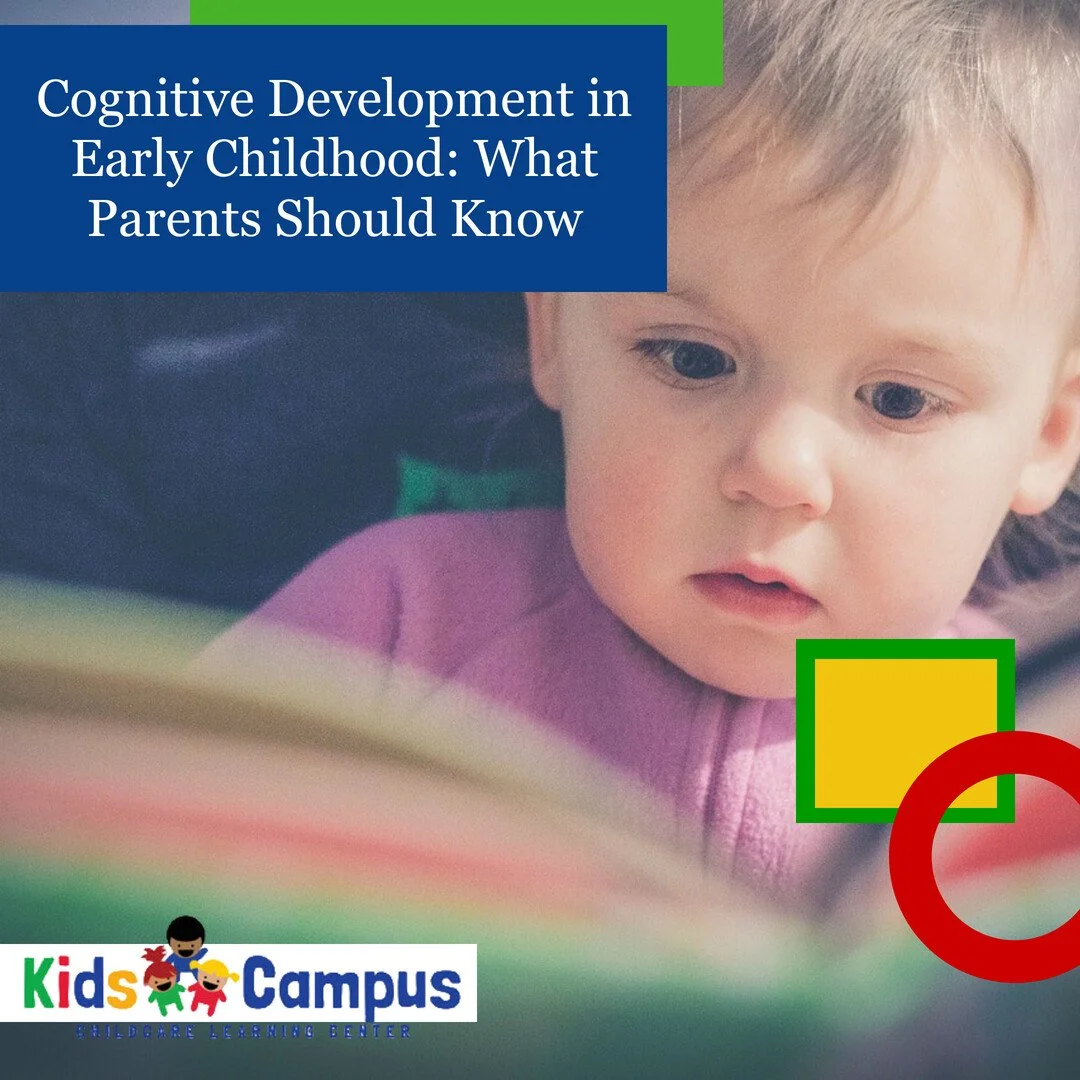Cognitive Development in Early Childhood: What Parents Should Know
The first five years of life are a period of incredible growth—not just physically, but mentally. Cognitive development in early childhood shapes how children think, explore, and understand the world around them. From problem-solving to language acquisition, these early skills lay the groundwork for success in school and beyond.
At Kids Campus, with locations in Lynbrook and Valley Stream, our programs are designed to nurture these crucial abilities through engaging, age-appropriate learning experiences.
What Is Cognitive Development?
Cognitive development refers to the progression of a child’s ability to think, reason, remember, and learn. It includes skills such as:
Language and communication
Problem-solving and critical thinking
Memory and recall
Understanding cause and effect
Basic math and literacy skills
The Centers for Disease Control and Prevention (CDC) emphasizes that fostering these abilities early supports long-term academic achievement and emotional well-being.
Stages of Cognitive Development in Early Childhood
Children develop cognitively in stages, though the pace may vary. Here’s an overview of what parents can typically expect:
1. Toddler Years (Ages 1–3)
Recognizing familiar objects and people
Following simple directions
Engaging in pretend play
Beginning to use short sentences
2. Preschool Years (Ages 3–4)
Asking “why” and “how” questions
Understanding simple time concepts (yesterday, today, tomorrow)
Sorting and matching by color, shape, or size
Retelling familiar stories
3. Kindergarten Age (Ages 5–6)
Recognizing letters and numbers
Understanding basic addition and subtraction concepts
Problem-solving in small group settings
Following multi-step instructions
For a detailed look at typical milestones, visit our article on Developmental Milestones.
Factors That Influence Cognitive Development
Several key factors impact cognitive development in early childhood:
Environment – A safe, stimulating space filled with books, toys, and opportunities for exploration helps children learn through play.
Nutrition – Proper nutrition supports brain growth, memory, and focus.
Social Interaction – Engaging with peers and adults fosters language skills and problem-solving abilities.
Early Education – High-quality early learning programs introduce children to structured activities that build focus, reasoning, and creativity.
The Harvard Center on the Developing Child notes that positive early experiences can strengthen brain architecture, making these years especially important.
How Parents Can Support Cognitive Development at Home
Parents play a powerful role in shaping their child’s cognitive growth. Here are some simple, effective strategies:
1. Read Together Daily
Reading boosts vocabulary, comprehension, and imagination. Choose age-appropriate books and ask open-ended questions about the story.
2. Encourage Problem-Solving
Offer puzzles, building blocks, or sorting games. Let your child figure out solutions rather than giving immediate answers.
3. Engage in Conversation
Discuss your day, ask for their opinions, and encourage them to explain their thoughts. This builds language and reasoning skills.
4. Incorporate Everyday Learning
Cooking together teaches measurements and following steps. Grocery shopping can be an opportunity to identify colors, numbers, and categories.
5. Limit Passive Screen Time
Interactive play is more beneficial than passive watching. If screen time is allowed, choose educational and age-appropriate content.
How Kids Campus Fosters Cognitive Development
At Kids Campus, our Programs are designed to nurture the whole child, with special emphasis on cognitive growth. We incorporate:
Hands-on learning activities to develop problem-solving skills
Storytime and group discussions to build language abilities
Creative arts and music to enhance memory and imagination
STEM-based play to introduce basic science and math concepts
Small group projects to encourage collaboration and communication
Our classrooms are intentionally structured to balance guided instruction with free exploration, giving children the tools to learn both independently and with peers.
Recognizing When to Seek Additional Support
While children develop at their own pace, some signs may indicate the need for extra evaluation, such as:
Difficulty following simple instructions
Limited vocabulary for their age
Struggling to remember familiar objects or routines
Lack of interest in interactive play
If you have concerns, speak with your pediatrician or an early childhood specialist. The Zero to Three organization provides excellent resources for understanding developmental milestones.
The Long-Term Benefits of Early Cognitive Development
Investing in cognitive development in early childhood sets the stage for lifelong learning. Children who develop strong thinking and problem-solving skills early on often:
Adapt more easily to new situations
Perform better academically
Show greater resilience in the face of challenges
Develop stronger social relationships
By working together—parents, educators, and caregivers—we can ensure every child has the opportunity to reach their full potential.
Partner with Kids Campus
At Kids Campus, we understand that early learning experiences shape the future. Our dedicated educators provide engaging activities, supportive guidance, and a safe environment where cognitive skills can flourish.
Learn more about our philosophy and visit our Lynbrook or Valley Stream locations to see how we help children think, explore, and grow with confidence.

